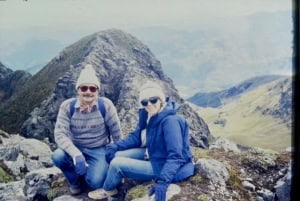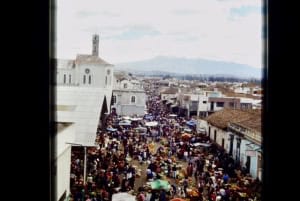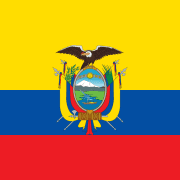Peace Corps Adventures in Ecuador with David Guzetta and Carolyn Auker
This is one of the last two of our series on the experiences of RVM residents in the Peace Corps. Also in this issue is the article on Betsy Portaro. The December issue featured Jean and John Herron and Russy and Anita Sumariwalla; the November issue contained articles on Joni Johnson and Asifa Kanji and David Drury.
by Joni Johnson
Unlike the other volunteers in our series on the Peace Corps, David Guzetta and Carolyn Auker joined the Peace Corps in 1988 right in the middle of their careers. Many join right out of college or shortly after retirement. David and Carolyn joined in their early 40’s. Both had moved to Amarillo, Texas from Columbus, Ohio for what was supposed to be a long contract with the Department of Energy for David. The contract ultimately disappeared within months, leaving many of its employees without home or resources. Luckily, David and Carolyn had lost nothing other than expectations since they had sold their home in Ohio and were footloose and fancy free. And so, rather than go back to what they had been doing before, they decided to search for adventure with the Peace Corps.
Fortunately, they were able to find placement as a professional couple in Ecuador. They did all of their training in Tumbaco, about thirty minutes away by bus from the capital of Quito and then moved to Quito for their projects. They lived in a three bedroom flat in a nice neighborhood in Quito. Dave had 15+ years of experience and a PhD in Environmental Science and Engineering, and so his first job was as Advisor to the National Director of the Ecuadorian Institute of Sanitary Works.

Scanner
Carolyn had been a Medical Lab technologist for 15+ years and was expecting to serve in some health care project. She found herself involved with MAP International, which provides medicinal assistance in developing countries. Her particular job was getting lab results from tests of local children for parasites in their blood. The hope was that there would be no parasites. However, the results were far from their expectations, and many children had three to six or more parasites living in their system due to the pollution in water and food.
Ecuador is a Spanish speaking country, and both David and Carolyn needed to improve their language skills. Dave had had only two years of Spanish in high school plus the three months of Peace Corps training. According to both of them, Carolyn had an excellent ear for languages, but they both needed work to improve their Spanish. Two years in Ecuador certainly gave them that opportunity. Dave spoke mainly Spanish during his tenure in Ecuador. And when Carolyn would travel to southern Ecuador once a month or two to a clinic, she would also have more of a chance to speak Spanish.
One story very vividly etched in their memory was the number of times Carolyn was robbed. They were never physically harmed, but they found that robbers, mostly old women, would work in pairs, so that one might squirt mustard on your back and then say “sucia” which meant dirty and then when you were trying to get rid of the mustard on your back, the other person would rob you in the front. After a while, Dave and Carolyn got very good at picking out who might try to get them, so it became much less of a problem. Once, they cornered one of the robbers, an old lady who Dave held against a car while yelling, “Ladrona, ladrona,” which means thief. She responded, “Yes, I’m a ladrona. Can you let me go now?”

After Dave’s first year with the Ecuadorian Institute, he changed his project to identifying where the sources of pollution existed for the city of Quito. Those included pollution in air, water and solid waste. He would meet face to face with his Ecuadorian counterparts and would help them complete a questionnaire on pollution.
Towards the end of their time in Ecuador, Dave helped a Russian woman translate a book on Air Quality Modeling from English to Russian. First, Dave translated it from English to Spanish (which became very useful to his office at the Institute) and then the woman translated it from Spanish to Russian for her office.
Dave and Carolyn found that they could travel on an amazingly small budget. They were able to manage a six-week trip through Bolivia, Peru and Chile by bus, staying in small hotels, for less than $1500 for the two of them.
Dave’s work with Pichincha Province was extremely helpful. It provided baseline data on the quantity and sources of pollution. Quito and the Province used this information to prioritize their work. The information collected was also used to apply for grants to international aid organization and non-government organizations (NGO).
Similarly, the work Carolyn did also helped to identify and quantify health issues that could be addressed by Medical Assistance Plan (her organization) and other health organization. Identifying a variety of parasites would also identify the source of these parasites. Most of them were water-born.
When asked how their PC experience had affected them, they said that it was important to learn how to live in a third world culture. They became more appreciative of the US and its relatively strong infrastructure as compared to the minimal help that people might receive in Ecuador. On the other hand, they were amazed at the ability to choose a live chicken at the market and then come back twenty minutes later to find it already plucked and ready for the oven. They appreciated the immediacy of that culture. They felt that what they gave to their Ecuadorian companions was a way to look at problems differently and more creatively since math was usually taught by rote in Ecuador. In looking back, they were so happy to have had the experience in Ecuador. It was really irreplaceable.




Dave and Carolyn,
I am very happy knowing you had a rewarding experience in Ecuador and able to travel to visit my country, Bolivia, Peru and Chile. Traveling by bus probably was something very different for you than here. You were very brave doing that. Kudos to you!
Dave and Carolyn,
I am very happy knowing you had a rewarding experience in Ecuador and able to travel to visit my country, Bolivia, and Peru and Chile. Traveling by bus probably was something very different for you than here. You were very brave doing that. Kudos to you!
Carolyn and David, what rich life experience you both have had, to do this mid life…that is daring. Love reading about it. Thank you for sharing. Sophia